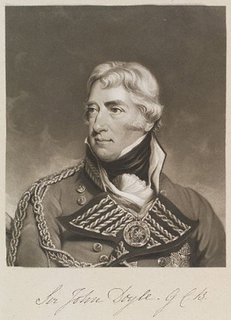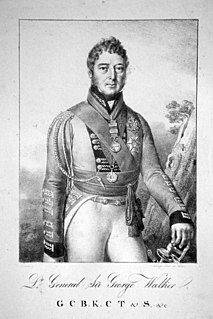
Field Marshal Hugh Gough, 1st Viscount Gough, was an Irish officer of the British Army. After serving as a junior officer at the seizure of the Cape of Good Hope during the French Revolutionary Wars, Gough commanded the 2nd Battalion of the 87th Regiment of Foot during the Peninsular War. After serving as commander-in-chief of the British forces in China during the First Opium War, he became Commander-in-Chief, India and led the British forces in action against the Marathas defeating them decisively at the conclusion of the Gwalior Campaign and then commanded the troops that defeated the Sikhs during both the First Anglo-Sikh War and the Second Anglo-Sikh War.

General Rowland Hill, 1st Viscount Hill, was a British Army officer who served in the Napoleonic Wars as a brigade, division and corps commander. He became Commander-in-Chief of the British Army in 1828.

Field Marshal Stapleton Cotton, 1st Viscount Combermere, was a British Army officer, diplomat and politician. As a junior officer he took part in the Flanders Campaign, in the Fourth Anglo-Mysore War and in the suppression of Robert Emmet's insurrection in 1803. He commanded a cavalry brigade in Sir Arthur Wellesley's Army before being given overall command of the cavalry in the latter stages of the Peninsular War. He went on to be Commander-in-Chief, Ireland and then Commander-in-Chief, India. In the latter role he stormed Bharatpur—a fort which previously had been deemed impregnable.
The 89th Regiment of Foot was a regiment of the British Army, raised on 3 December 1793. Under the Childers Reforms the regiment amalgamated with the 87th Regiment of Foot to form the Princess Victoria's in 1881.
General Sir James Murray Pulteney, 7th Baronet PC was a Scottish soldier and British politician.
The Douglas of Glenbervie, Kincardine Baronetcy was created on 28 May 1625 in the Baronetage of Nova Scotia.

Field Marshal Sir Edward Blakeney was a British Army officer. After serving as a junior officer with the expedition to Dutch Guiana and being taken prisoner by privateers three times suffering great hardship, he took part in the Anglo-Russian invasion of Holland in 1799. He also joined the expedition to Denmark led by Lord Cathcart in 1807. He went on to command the 2nd Battalion of the 7th Regiment of Foot and then both battalions of that regiment at many of the battles of the Peninsular War. After joining the Duke of Wellington as he marched into Paris in 1815, Blakeney fought in the War of 1812. He then commanded a brigade in the army sent on a mission to Portugal to support the constitutional government against the absolutist forces of Dom Miguel in 1826. His last major appointment was as Commander-in-Chief, Ireland, a post he held for nearly twenty years.

General Sir William Anson, 1st Baronet, was a British officer from the Anson family. He became a general in the British Army and noted for his service in Peninsular War.
Lieutenant-General Sir Alexander Campbell, 1st Baronet, was a senior officer of the British Army during the early nineteenth century. His long and varied career saw extensive action, including engagements in Europe during the American Revolutionary War, in India during the Fourth Anglo-Mysore War and subsequently in the Peninsular War as one of the Duke of Wellington's generals. Badly wounded during the Peninsular campaign, Campbell was rewarded with a knighthood and a baronetcy, later holding a number of prestigious military commands.
General Sir William Houston, 1st BaronetKC was a British Army officer and Governor of Gibraltar. Houston joined the army in 1781, and by the start of the French Revolutionary War was a captain. He fought in the Flanders campaign before being promoted to major in 1794. As a lieutenant-colonel he fought at the Capture of Minorca and at the sieges of Alexandria and Cairo. Promoted to colonel in 1802, Houston fought in the Walcheren Expedition of 1809 before being promoted to major-general.
The Myers Baronetcy was a title in the Baronetage of the United Kingdom. It was created on 3 July 1804 for Lieutenant-General William Myers, Commander of the British Forces in the West Indies. The title became extinct in 1811 on the death of the second Baronet, who was killed in action at the Battle of Albuera.

General Sir John Doyle, 1st Baronet GCB, KCH was an officer in the British Army, which he joined in March 1771. He served with distinction in the American War of Independence and the French Revolutionary Wars.
John Cameron (1771–1815) of Fassiefern, Inverness-shire, was a cousin of the Camerons of Lochiel and a celebrated Scottish military commander
General Sir Henry Frederick Campbell, was a soldier of the British Army.

General Sir George Townshend Walker, 1st Baronet, GCB ComTE was a British Army officer. He joined the army in 1782, but after his first two regiments were quickly disbanded, he joined the 36th Regiment of Foot stationed in India in 1784. He returned to England in 1787 suffering from an illness, and became aide de camp to General Thomas Bruce in Ireland. After being promoted to captain lieutenant, Walker studied German and tactics in Germany until he was promoted to captain in the 60th Regiment of Foot in 1791. When the French Revolutionary War began in 1793, he took a force of volunteers to reinforce the Flanders Campaign, where he fought at the Battle of Tournay. He was appointed Inspector of Foreign Corps while serving on the continent, and as such helped form Roll's Regiment for British service. He took them to England in 1796, and having been promoted to major he went to serve in Portugal in 1797. Here Walker again served as an aide de camp, to at first Major-General Simon Fraser and then the Prince of Waldeck.
Lieutenant-General Sir William Myers, 1st Baronet was a British soldier, born in Whitehaven. His father was Christopher Myers of Monkstown, County Dublin [formerly of Whitehaven] who was the architect of the Chapel of Trinity College Dublin. His mother was Jean Graham, cousin to the 3rd Duke of Montrose.

Lieutenant-General Sir Robert Lawrence Dundas was a British Whig and military commander during the Peninsular War. He was a Member of Parliament in the House of Commons representing Malton from 1807 to 1812, East Retford from 1826 to 1827, and Richmond from 1828 to 1834 and from 1839 to 1841.

Sir Thomas Reynell, 6th Baronet (1777–1848) was a 19th century British Army officer. He was Colonel in Chief of the 71st Highlanders from 1841 to 1848.

General Sir Charles Bulkeley Egerton, GCMG, KCH (1774–1857) was a British Army officer that served in the French Revolutionary Wars and Napoleonic Wars, He would command a brigade in the 5th Division during the Peninsular War.
Major-General Richard Hulse was a senior British Army officer who saw action in the Napoleonic Wars.










